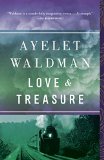Summary | Excerpt | Reading Guide | Reviews | Beyond the Book | Read-Alikes | Genres & Themes | Author Bio

This article relates to Love and Treasure
Although aligned with the Axis powers, Hungary avoided direct participation in World War II until 1941 and most Jews in the country were protected from deportation, although they were subject to anti-Jewish laws. This changed in 1944 when Hitler discovered that Hungary had been secretly engaged in peace negotiations with the USA and UK and, shortly after, German forces occupied the country - after which wholesale deportation of Jews and Roma to concentration camps began. By the end of the war it is estimated that upwards of 600,000 Hungarian Jews and 28,000 Roma had been killed.
Soon after taking over control in 1944, the pro-Nazi Hungarian Government, led by Ferenc Szálasi, ordered Jewish citizens to hand over the vast majority of their property to government officials. Shortly thereafter, as the threat of invasion from Soviet Russia became an ever-pressing issue, the combined forces of the SS (under the instructions of Adolf Eichmann) and the fascist Arrow Cross Party of Hungary collaborated to transport billions of dollars worth of this Jewish Hungarian property.
A huge freight train destined for Berlin, that became known as the "Hungarian Gold Train," carried these treasures out of Hungary. This train forms the basis for Love and Treasure. Delayed by the battles still raging across the continent and plagued by looters, some of them SS men themselves, the train reached Salzburg, Austria, just as the war was drawing to a close. As the road became completely blocked and they could go no further, the passengers and soldiers guarding the train made their escape to evade capture.
A couple of weeks later, American soldiers stumbled across the train and discovered the stolen art, jewels, gold (boxes of wedding rings and even gold teeth), furs, silverware and other personal possessions including silk underwear. With portions of the train also seized by the French, the Americans sent the property into safe storage outside the city and awaited further orders.
Although the movie "The Monuments Men" (based on Saving Italy by Robert Edsel) portrays the United States in honorable and heroic terms when it comes to recovering stolen goods in Italy, it would seem there were some bad apples elsewhere. Documentary evidence shows that the U.S. authorities declared it to be impossible to either identify or locate the owners of the belongings stored on the train, and refused access to members of the Hungarian Jewish community who might have been able to identify some of the property. They also claimed that due to certain territorial charges, it was not possible to simply hand the goods over to the Hungarian Government. Some high-ranking U.S. officials took advantage of the situation to take assets for their personal use, and other items were sold through the Army Exchange.
Adding to unrecorded thefts from the warehouses, the American portion of the loot was auctioned off in favor of war relief efforts or turned over to the United Nations International Refugee Organization. This caused much consternation in the Hungarian Government and Jewish Community who claimed they could locate the rightful owners/heirs of the majority of the goods.
Since the end of World War II, the fallout from these decisions has been far-reaching. Much of the artwork (originally stored in a different location) was not returned to Hungary and disappeared altogether. The United States eventually admitted wrongdoing, and worked, through the appointment of the U.S. Presidential Advisory Commission on Holocaust Assets, to track the trail of these treasures. In 2001, a class-action lawsuit, Rosner v United States, was filed on behalf of the Jewish Hungarians and their descendants. Curiously enough, despite the United States having admitted culpability, the U.S. Department of Justice fought this suit vigorously stating, among other reasons, that the events had taken place too long ago. The suit saw a settlement of $25.5 million in favor of the plaintiffs, with around $21 million going to fund social service projects benefiting eligible members many still in Hungary.
Filed under People, Eras & Events
![]() This "beyond the book article" relates to Love and Treasure. It originally ran in June 2014 and has been updated for the
January 2015 paperback edition.
Go to magazine.
This "beyond the book article" relates to Love and Treasure. It originally ran in June 2014 and has been updated for the
January 2015 paperback edition.
Go to magazine.
Your guide toexceptional books
BookBrowse seeks out and recommends the best in contemporary fiction and nonfiction—books that not only engage and entertain but also deepen our understanding of ourselves and the world around us.